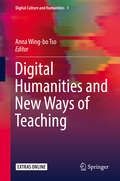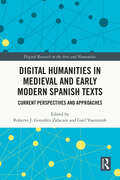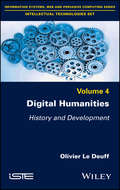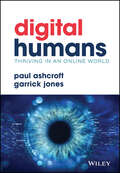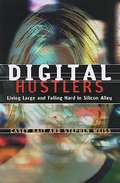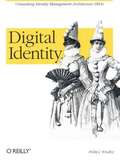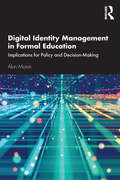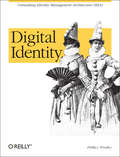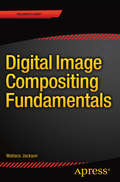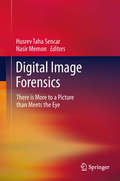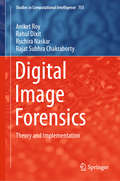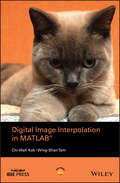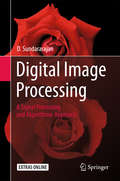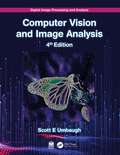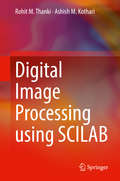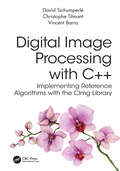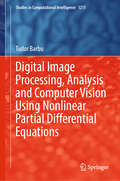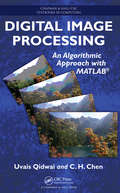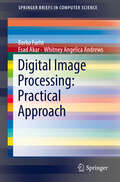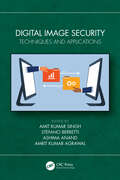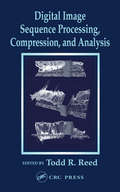- Table View
- List View
Digital Humanities and New Ways of Teaching (Digital Culture and Humanities #1)
by Anna Wing-bo TsoThis volume includes a variety of first-hand case studies, critical analyses, action research and reflective practice in the digital humanities which ranges from digital literature, library science, online games, museum studies, information literacy to corpus linguistics in the 21st century. It informs readers of the latest developments in the digital humanities and their influence on learning and teaching.With the growing advancement of digital technology, humanistic inquiries have expanded and transformed in unfathomable complexity as new content is being rapidly created. The emergence of electronic archiving, digital scholarship, digitized pedagogy, textual digitization and software creation has brought about huge impacts on both humanities subjects and the university curricula in terms of nature, scope and design. This volume provides insights into what these technological changes mean for all the stakeholders involved and for the ways in which humanities subjects are understood. Part 1 of this volume begins with a broad perspective on digital humanities and discusses the current status of the field in Asia, Canada and Europe. Then, with a special focus on new literacies, educational implications, and innovative research in the digital humanities, Parts 2-4 explore how digital technology revolutionizes art forms, curricula, and pedagogy, revealing the current practices and latest trends in the digital humanities.Written by experts and researchers across Asia, Australia, Canada and Europe, this volume brings global insights into the digital humanities, particularly in the education aspect. It is of interest to researchers and students of cultural studies, literature, education, and technology studies.The strongest point of this collection of work is that, it brings important concepts to the study of digital literacies, for example, looking at it from the perspective of new literacies, languages and education.Daniel Churchill, Associate Professor, Faculty of Education, The University of Hong KongWith a rapidly growing advancement in digital tools, this book has made a relevant contribution by informing readers what the latest development of these tools are, and discusses how they can aid research, libraries, education and even poets across different continents. Samuel Kai-wah Chu, Associate Professor, Faculty of Education, The University of Hong Kong
Digital Humanities in Medieval and Early Modern Spanish Texts: Current Perspectives and Approaches (Digital Research in the Arts and Humanities)
by González Zalacain, Roberto J. Gael VaamondeThis volume fills a gap in the literature on digital humanities (DH) in the Hispanic context by gathering a heterogeneous group of specialists who, from different standpoints in the humanities, explore Spanish texts as the object of study, DH as the work methodology, and Medieval and Early Modern Times as the historical framework.The volume gathers authors from Spain and other countries who work at the intersections of the DH and the areas of history, philology, literature, or linguistics, to explore some of the diverse DH projects working on Spanish texts from this period, and their wider implications. Taking historical sources as the starting point, contributions to this volume include topics such as historical corpus design, TEI-based digital edition, 3D modelling, database architecture, or automatic text annotation. For readers interested in the subject, the book provides a stimulating discussion with in-depth and concrete analyses of the interrelationships between the different contributions.This volume will be of great interest to medievalists and early modern researchers, whether involved in linguistic, historical, or literary studies, demonstrating the advantages of considering digital tools and computational methods in their academic work. In addition, it will also appeal to postgraduate students in the field of DH.
Digital Humanities: History and Development
by Olivier Le DeuffWhere do the digital humanities really come from? Are they really news? What are the theoretical and technical influences that participate in this scientific field that arouses interest and questions? This book tries to show and explain the main theories and methods that have allowed their current constitution. The aim of the book is to propose a new way to understand the history of digital humanities in a broader perspective than the classic history with the project of Robert Busa. The short digital humanities perspective neglects lots of actors and disciplines. The book tries to show the importance of other fields than humanities computing like scientometry, infometry, econometry, mathematical linguistics, geography and documentation.
Digital Humans: Thriving in an Online World
by Garrick Jones Paul AshcroftEmbrace the Human Side of Organisational Digital Transformation Digital Humans: Thriving in an Online World is an insightful, engaging and interdisciplinary discussion of how best to transform your organisation into a nimble, digital enterprise with human beings firmly established at the centre of it. The authors draw on complexity theory, anthropology, history, organisational transformation and behavioural science to demonstrate the characteristics that define successful digital organisations. You’ll discover the importance of focusing on human beings even as you make the shift to digital and learn to understand the importance of our new digital ecosystems. Illuminating case studies and examples of organisations that have successfully made the jump to digital are explored and the book presents new and effective ways to make strategic decisions about your company’s future based on our new physical-digital hybrid reality. A can’t-miss blueprint to a market environment and world that’s increasingly fast-moving, complex and rewarding, Digital Humans will find a place in the libraries of managers, executives, and business leaders looking for an engaging roadmap to digital transformation that wouldn’t have us leave our humanity behind.
Digital Hustlers: Living Large and Falling Hard in Silicon Alley
by Casey Kait Stephen WeissThe commercial and cultural explosion of the digital age may have been born in California's Silicon Valley, but it reached its high point of riotous, chaotic exuberance in New York City from 1995 to 2000 - in the golden age of Silicon Alley. In that short period of time a generation of talented, untested twentysomethings deluged the city, launching thousands of new Internet ventures and attracting billions of dollars in investment capital. Many of these young entrepreneurs were entranced by the infinite promise of the new medium; others seemed more captivated by the promise of infinite profits. The innovations they launched - from online advertising to twenty-four hour webcasting - propelled both the Internet and the tech-stock boom of the late nineties. And in so doing they sent the city around them into a maelstrom of brainstorming, code-writing, fund-raising, drugs, sex, and frenzied hype... until April 2000, when the NASDAQ zeppelin finally burst and fell at their feet." "In Digital Hustlers, Alley insiders Casey Kait and Stephen Weiss have captured the excitement and excesses of this remarkable moment in time. Weaving together the perspectives of more than fifty of the industry's leading characters, this extraordinary oral history offers a ground-zero look at the birth of a new medium. Here are entrepreneurs like Kevin O'Connor of Double Click, Fernando Espuelas of StarMedia, and Craig Kanarick of Razorfish; commentators like Omar Wasow of MSNBC and Jason McCabe Calacanis of the Silicon Alley Reporter; and inimitable Alley characters like party diva Courtney Pulitzer and Josh Harris, the clown prince of Pseudo.com. Together they describe a world of sweatshop programmers and paper millionaires, of cocktail-napkin business plans and billion-dollar IPOs, of spectacular successes and flameouts alike.
Digital Identity
by Phil WindleyThe rise of network-based, automated services in the past decade has definitely changed the way businesses operate, but not always for the better. Offering services, conducting transactions and moving data on the Web opens new opportunities, but many CTOs and CIOs are more concerned with the risks. Like the rulers of medieval cities, they've adopted a siege mentality, building walls to keep the bad guys out. It makes for a secure perimeter, but hampers the flow of commerce. Fortunately, some corporations are beginning to rethink how they provide security, so that interactions with customers, employees, partners, and suppliers will be richer and more flexible. Digital Identity explains how to go about it. This book details an important concept known as "identity management architecture" (IMA): a method to provide ample protection while giving good guys access to vital information and systems. In today's service-oriented economy, digital identity is everything. IMA is a coherent, enterprise-wide set of standards, policies, certifications and management activities that enable companies like yours to manage digital identity effectively--not just as a security check, but as a way to extend services and pinpoint the needs of customers. Author Phil Windley likens IMA to good city planning. Cities define uses and design standards to ensure that buildings and city services are consistent and workable. Within that context, individual buildings--or system architectures--function as part of the overall plan. With Windley's experience as VP of product development for Excite@Home.com and CIO of Governor Michael Leavitt's administration in Utah, he provides a rich, real-world view of the concepts, issues, and technologies behind identity management architecture. How does digital identity increase business opportunity? Windley's favorite example is the ATM machine. With ATMs, banks can now offer around-the-clock service, serve more customers simultaneously, and do it in a variety of new locations. This fascinating book shows CIOs, other IT professionals, product managers, and programmers how security planning can support business goals and opportunities, rather than holding them at bay.
Digital Identity
by Phil WindleyThe rise of network-based, automated services in the past decade has definitely changed the way businesses operate, but not always for the better. Offering services, conducting transactions and moving data on the Web opens new opportunities, but many CTOs and CIOs are more concerned with the risks. Like the rulers of medieval cities, they've adopted a siege mentality, building walls to keep the bad guys out. It makes for a secure perimeter, but hampers the flow of commerce. Fortunately, some corporations are beginning to rethink how they provide security, so that interactions with customers, employees, partners, and suppliers will be richer and more flexible. Digital Identity explains how to go about it. This book details an important concept known as "identity management architecture" (IMA): a method to provide ample protection while giving good guys access to vital information and systems. In today's service-oriented economy, digital identity is everything. IMA is a coherent, enterprise-wide set of standards, policies, certifications and management activities that enable companies like yours to manage digital identity effectively--not just as a security check, but as a way to extend services and pinpoint the needs of customers. Author Phil Windley likens IMA to good city planning. Cities define uses and design standards to ensure that buildings and city services are consistent and workable. Within that context, individual buildings--or system architectures--function as part of the overall plan. With Windley's experience as VP of product development for Excite@Home.com and CIO of Governor Michael Leavitt's administration in Utah, he provides a rich, real-world view of the concepts, issues, and technologies behind identity management architecture. How does digital identity increase business opportunity? Windley's favorite example is the ATM machine. With ATMs, banks can now offer around-the-clock service, serve more customers simultaneously, and do it in a variety of new locations. This fascinating book shows CIOs, other IT professionals, product managers, and programmers how security planning can support business goals and opportunities, rather than holding them at bay.
Digital Identity Management in Formal Education: Implications for Policy and Decision-Making
by Alan MoranDigital Identity Management in Formal Education offers a broad analysis of the online self considered from educational policy, technological, legal and social perspectives. This book introduces the reader to the notion that digital identity is a multifaceted topic which requires a broad and systematic approach that is rooted in risk-based policy. It provides educational technologists, leaders and decision-makers with an accessible, jargon-free guide to their responsibilities towards students and instructors in today’s digitally networked schools and universities. Real-life examples illustrate how digital identities impact management and delivery, privacy and transactions, governance and accountability, and other interconnected choices in the use of technology-enabled services in formal learning.
Digital Identity: Unmasking Identity Management Architecture (IMA)
by Phillip J. WindleyThe rise of network-based, automated services in the past decade has definitely changed the way businesses operate, but not always for the better. Offering services, conducting transactions and moving data on the Web opens new opportunities, but many CTOs and CIOs are more concerned with the risks. Like the rulers of medieval cities, they've adopted a siege mentality, building walls to keep the bad guys out. It makes for a secure perimeter, but hampers the flow of commerce.Fortunately, some corporations are beginning to rethink how they provide security, so that interactions with customers, employees, partners, and suppliers will be richer and more flexible. Digital Identity explains how to go about it. This book details an important concept known as "identity management architecture" (IMA): a method to provide ample protection while giving good guys access to vital information and systems. In today's service-oriented economy, digital identity is everything. IMA is a coherent, enterprise-wide set of standards, policies, certifications and management activities that enable companies like yours to manage digital identity effectively--not just as a security check, but as a way to extend services and pinpoint the needs of customers.Author Phil Windley likens IMA to good city planning. Cities define uses and design standards to ensure that buildings and city services are consistent and workable. Within that context, individual buildings--or system architectures--function as part of the overall plan. With Windley's experience as VP of product development for Excite@Home.com and CIO of Governor Michael Leavitt's administration in Utah, he provides a rich, real-world view of the concepts, issues, and technologies behind identity management architecture.How does digital identity increase business opportunity? Windley's favorite example is the ATM machine. With ATMs, banks can now offer around-the-clock service, serve more customers simultaneously, and do it in a variety of new locations. This fascinating book shows CIOs, other IT professionals, product managers, and programmers how security planning can support business goals and opportunities, rather than holding them at bay.
Digital Illustration Fundamentals
by Wallace JacksonThis fun, concise, fullcolor book introduces the fundamentals of digital illustration, and covershow to develop and optimize these types of scalable vector graphics (SVG) usingInkscape 0. 91 or later. It also covers concepts central to digital paintingusing the Corel Painter 2016 professional digital painting and illustrationpaid software package, which also has a free trial version, and a discount forpurchasers of this book. The book builds uponthe foundational concepts of vector graphics and the SVG format, and gets moreadvanced as chapters progress, covering what vector new media formats, and SVGcommands and SVG filters, are best for use with Android Studio, Java 8, JavaFX,iOS, Kindle Fire and HTML5. The book covers key factors regarding the datafootprint optimization work process, and why data footprint optimization isimportant, and covers programming languages used for digital illustration, andpublishing platforms which support digital illustration, and how to assimilatethese into your digital illustration and digital painting content productionpipelines and workflow. You will learn: The terminology of vector imaging and digital illustration What comprises a digital illustration 2D modeling and rendering pipeline Concepts and principles behind digital illustration content production How to install and utilize 64-bit Inkscape 0. 91 for Windows, Mac OSX and Linux Concepts behind spline curves, strokes, fills, patterns and rendering Digital illustration data formats and data footprint optimization Audience Primary: Artists, Illustrators, Website Developers, Flash Developers, User Interface Designers, Digital Signage Content Developers, e-Learning Content Creators, eBook Authors. Secondary: Android Developers, iOS Developers, Multimedia Producers, Rich Internet Application (RIA) Programmers, Game Designers, Teachers, Educators.
Digital Image Compositing Fundamentals
by Wallace JacksonDigital Image Compositing Fundamentals is an introductory title covering concepts central to digital imagery and digital image compositing using software packages such as Adobe Photoshop or the open source GIMP software, which is used for this book because it is free for commercial use. This book builds on the fundamental concepts of pixels, color depth and layers, and gets more advanced as chapters progress, covering pixel transparency using the alpha channel, pixel blending using Porter-Duff blending and transfer modes, and digital image file formats and key factors regarding a data footprint optimization work process. What You'll Learn: What are the most common memes in digital imaging What comprises a digital image compositing pipeline What are the concepts behind digital imaging How to install and use GIMP 2. 8 or 2. 9 What are and how to use the concepts behind color depth and image optimization Audience: This book is for those new to image compositing, editing. Ideal for web developers, game developers who need to learn these kinds of fundamentals quickly and effectively.
Digital Image Forensics
by Husrev Taha Sencar Nasir MemonPhotographic imagery has come a long way from the pinhole cameras of the nineteenth century. Digital imagery, and its applications, develops in tandem with contemporary society's sophisticated literacy of this subtle medium. This book examines the ways in which digital images have become ever more ubiquitous as legal and medical evidence, just as they have become our primary source of news and have replaced paper-based financial documentation. Crucially, the contributions also analyze the very profound problems which have arisen alongside the digital image, issues of veracity and progeny that demand systematic and detailed response: It looks real, but is it? What camera captured it? Has it been doctored or subtly altered? Attempting to provide answers to these slippery issues, the book covers how digital images are created, processed and stored before moving on to set out the latest techniques for forensically examining images, and finally addressing practical issues such as courtroom admissibility. In an environment where even novice users can alter digital media, this authoritative publication will do much so stabilize public trust in these real, yet vastly flexible, images of the world around us.
Digital Image Forensics: Theory and Implementation (Studies in Computational Intelligence #755)
by Rajat Subhra Chakraborty Aniket Roy Rahul Dixit Ruchira NaskarThis book discusses blind investigation and recovery of digital evidence left behind on digital devices, primarily for the purpose of tracing cybercrime sources and criminals. It presents an overview of the challenges of digital image forensics, with a specific focus on two of the most common forensic problems. The first part of the book addresses image source investigation, which involves mapping an image back to its camera source to facilitate investigating and tracing the source of a crime. The second part of the book focuses on image-forgery detection, primarily focusing on “copy-move forgery” in digital images, and presenting effective solutions to copy-move forgery detection with an emphasis on additional related challenges such as blur-invariance, similar genuine object identification, etc. The book concludes with future research directions, including counter forensics. With the necessary mathematical information in every chapter, the book serves as a useful reference resource for researchers and professionals alike. In addition, it can also be used as a supplementary text for upper-undergraduate and graduate-level courses on “Digital Image Processing”, “Information Security”, “Machine Learning”, “Computer Vision” and “Multimedia Security and Forensics”.
Digital Image Interpolation in Matlab (Wiley - IEEE)
by Wing-Shan Tam Chi-Wah KokThis book provides a comprehensive study in digital image interpolation with theoretical, analytical and Matlab® implementation. It includes all historically and practically important interpolation algorithms, accompanied with Matlab® source code on a website, which will assist readers to learn and understand the implementation details of each presented interpolation algorithm. Furthermore, sections in fundamental signal processing theories and image quality models are also included. The authors intend for the book to help readers develop a thorough consideration of the design of image interpolation algorithms and applications for their future research in the field of digital image processing. Introduces a wide range of traditional and advanced image interpolation methods concisely and provides thorough treatment of theoretical foundations Discusses in detail the assumptions and limitations of presented algorithms Investigates a variety of interpolation and implementation methods including transform domain, edge-directed, wavelet and scale-space, and fractal based methods Features simulation results for comparative analysis, summaries and computational and analytical exercises at the end of each chapter Digital Image Interpolation in Matlab® is an excellent guide for researchers and engineers working in digital imaging and digital video technologies. Graduate students studying digital image processing will also benefit from this practical reference text.
Digital Image Processing
by Shriram K Vasudevan A Baskar Muthaiah Rajappa T S MurugeshThe book provides a mix of theoretical and practical perceptions of the related concepts pertaining to image processing. The primary objectives are to offer an overview to the elementary concepts and practices appropriate to digital image processing as well as to provide theoretical exposition. It starts with an expanded coverage of the fundamentals to provide a more comprehensive and cohesive coverage of the topics including but not limited to: Applications and tools for image processing, and fundamentals with several implementation examples Concepts of image formation OpenCV installation with step-by-step screen shots Concepts behind intensity, brightness and contrast, color models Ways by which noises are created in an image and the possible remedial measures Edge detection, image segmentation, classification, regression, classification algorithms Importance of frequency domain in image processing field Relevant code snippets and the MATLAB® codes, and several interesting sets of simple programs in OpenCV and Python to aid learning and for complete understanding The video lectures for specific topics through YouTube enable easy inference for the readers to apply the learnt theory into practice. The addition of contents at the end of each chapter such as quizzes and review questions fully prepare the readers for further study. Graduate students, post graduate students, researchers, and anyone in general interested in image processing, computer vision, machine learning domains etc. can find this book an excellent starting point for information and an able ally.
Digital Image Processing
by D. SundararajanThis book offers readers an essential introduction to the fundamentals of digital image processing. Pursuing a signal processing and algorithmic approach, it makes the fundamentals of digital image processing accessible and easy to learn. It is written in a clear and concise manner with a large number of 4 x 4 and 8 x 8 examples, figures and detailed explanations. Each concept is developed from the basic principles and described in detail with equal emphasis on theory and practice. The book is accompanied by a companion website that provides several MATLAB programs for the implementation of image processing algorithms. The book also offers comprehensive coverage of the following topics: Enhancement, Transform processing, Restoration, Registration, Reconstruction from projections, Morphological image processing, Edge detection, Object representation and classification, Compression, and Color processing.
Digital Image Processing and Analysis: Computer Vision and Image Analysis
by Scott E UmbaughComputer Vision and Image Analysis, focuses on techniques and methods for image analysis and their use in the development of computer vison applications. The field is advancing at an ever increasing pace, with applications ranging from medical diagnostics to space exploration. The diversity of applications is one of the driving forces that make it such an exciting field to be involved in for the 21st century. This book presents a unique engineering approach to the practice of computer vision and image analysis, which starts by presenting a global model to help gain an understanding of the overall process, followed by a breakdown and explanation of each individual topic. Topics are presented as they become necessary for understanding the practical imaging model under study, which provides the reader with the motivation to learn about and use the tools and methods being explored. The book includes chapters on image systems and software, image analysis, edge, line and shape detection, image segmentation, feature extraction and pattern classification. Numerous examples, including over 500 color images are used to illustrate the concepts discussed. Readers can explore their own application development with any programming languages, including C/C++, MATLAB®, Python, and R, and software is provided for both the Windows/C/C++ and MATLAB®environments. The book can be used by the academic community in teaching and research, with over 700 PowerPoint Slides and a complete Solutions Manual to the over 150 included problems. It can also be used for self-study by those involved with developing computer vision applications, whether they are engineers, scientists or artists. The new edition has been extensively updated and includes numerous problems and programming exercises that will help the reader and student to develop their skills.
Digital Image Processing for Medical Applications
by Geoff DoughertyImage processing is a hands-on discipline, and the best way to learn is by doing. This text takes its motivation from medical applications and uses real medical images and situations to illustrate and clarify concepts and to build intuition, insight and understanding. Designed for advanced undergraduates and graduate students who will become end-users of digital image processing, it covers the basics of the major clinical imaging modalities, explaining how the images are produced and acquired. It then presents the standard image processing operations, focusing on practical issues and problem solving. Crucially, the book explains when and why particular operations are done, and practical computer-based activities show how these operations affect real images. All images, links to the public-domain software ImageJ and custom plug-ins, and selected solutions are available from www. cambridge. org/books/dougherty.
Digital Image Processing using SCILAB
by Rohit M. Thanki Ashish M. KothariThis book provides basic theories and implementations using SCILAB open-source software for digital images. The book simplifies image processing theories and well as implementation of image processing algorithms, making it accessible to those with basic knowledge of image processing. This book includes many SCILAB programs at the end of each theory, which help in understanding concepts. The book includes more than sixty SCILAB programs of the image processing theory. In the appendix, readers will find a deeper glimpse into the research areas in the image processing.
Digital Image Processing with C++: Implementing Reference Algorithms with the CImg Library
by David Tschumperle Christophe Tilmant Vincent BarraDigital Image Processing with C++ presents the theory of digital image processing, and implementations of algorithms using a dedicated library. Processing a digital image means transforming its content (denoising, stylizing, etc.), or extracting information to solve a given problem (object recognition, measurement, motion estimation, etc.). This book presents the mathematical theories underlying digital image processing, as well as their practical implementation through examples of algorithms implemented in the C++ language, using the free and easy-to-use CImg library. Chapters cover in a broad way the field of digital image processing and proposes practical and functional implementations of each method theoretically described. The main topics covered include filtering in spatial and frequency domains, mathematical morphology, feature extraction and applications to segmentation, motion estimation, multispectral image processing and 3D visualization. Students or developers wishing to discover or specialize in this discipline, teachers and researchers wishing to quickly prototype new algorithms, or develop courses, will all find in this book material to discover image processing or deepen their knowledge in this field.
Digital Image Processing, Analysis and Computer Vision Using Nonlinear Partial Differential Equations (Studies in Computational Intelligence #1211)
by Tudor BarbuThis book provides an overview of the applications of partial differential equations (PDEs) to image processing, analysis, and computer vision domains, focusing mainly on the most important contributions of the author in these closely related fields. It addresses almost all the PDE-based image processing and analysis areas, and the connections between partial differential equations, computer vision, and artificial intelligence: PDE-based image filtering, inpainting, compression, segmentation, content-based recognition, indexing and retrieval, and video object detection and tracking, energy-based (variational) and nonlinear diffusion-based models of second and fourth order, nonlinear PDE-based scale-spaces in combination to convolutional neural networks and high-level descriptors to perform edge and feature extraction.
Digital Image Processing: An Algorithmic Approach with MATLAB (Chapman & Hall/CRC Textbooks in Computing)
by Uvais Qidwai C.H. ChenAvoiding heavy mathematics and lengthy programming details, Digital Image Processing: An Algorithmic Approach with MATLAB presents an easy methodology for learning the fundamentals of image processing. The book applies the algorithms using MATLAB, without bogging down students with syntactical and debugging issues.One chapter can typically be compl
Digital Image Processing: Practical Approach (SpringerBriefs in Computer Science)
by Borko Furht Esad Akar Whitney Angelica AndrewsThe SpringerBrief covers fundamentals of digital image processing including image concept, image file formats, creating user interfaces and many practical examples of processing images using C++ and Java. These practical examples include among other creating image histograms, performing lossless image compression, detecting change in colors, similarity-based image retrieval and others. All practical examples are accompanied with an explanation how to create programs and the obtained results. This SpringerBrief can be very useful for the undergraduate courses on image processing, providing students with the basic tools in image analysis and processing. Practitioners and researchers working in this field will also find this research useful.
Digital Image Security: Techniques and Applications
by Amit Kumar Singh Stefano Berretti Ashima Anand Amrit Kumar AgrawalThis book will highlight cutting-edge research with a particular emphasis on interdisciplinary approaches, novel techniques, and solutions to provide digital image security for applications in diverse areas. It further discusses important topics such as biometric imaging, big data security and privacy in healthcare, security and privacy in the internet of things, and security in cloud-based image processing.This book Presents new ideas, approaches, theories, and practices with a focus on digital image security and privacy solutions for real-world applications. Discusses security in cloud-based image processing for smart city applications. Provides an overview of innovative security techniques that are being developed to ensure the guaranteed authenticity of transmitted, shared, or stored digital images. Highlights approaches such as watermarking, blockchain, and hashing. to secure digital images in artificial intelligence, machine learning, cloud computing, and temper detection environments. Explains important topics such as biometric imaging, blockchain for digital data security, and protection systems against personal identity theft. It will serve as an ideal reference text for senior undergraduate, graduate students, academic researchers, and professionals in the fields including electrical engineering, electronics, communications engineering, and computer engineering.
Digital Image Sequence Processing, Compression, and Analysis (Computer Engineering Ser.)
by Todd R. ReedDigital image sequences (including digital video) are increasingly common and important components in technical applications ranging from medical imaging and multimedia communications to autonomous vehicle navigation. The immense popularity of DVD video and the introduction of digital television make digital video ubiquitous in the consumer domain.
